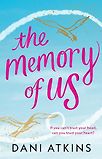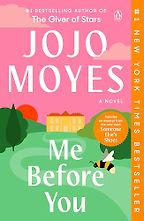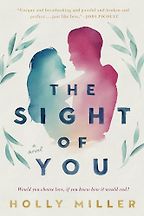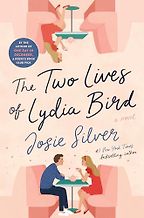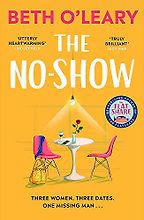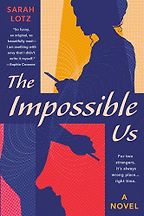You’re recommending some of your favourite romance books with a bit of a twist. Can you tell me how you chose them—what your criteria were?
These books are what they call ‘high concept’ romances. They’re not your traditional ‘boy meets girl, boy loses girl, boy finds girl in the end.’ There’s normally something else underlying the plotline, which elevates it slightly from your traditional rom-com.
I like reading emotional dramas. I like an element of not exactly the supernatural, but otherworldliness—something that’s a little bit fey and not quite run-of-the-mill. The books that I picked today all seem to come into that category.
They’re also all books I wish I’d written myself. They’re the books that I aspire to write and love to read.
Your latest book, The Memory of Us, opens with a life-or-death situation. Is that usual for you, then—that emotional aspect?
It is a theme going through most of my books. They’re all emotional dramas and you should have a tissue or two to hand. I cry when I write them—but a lot of authors cry when they’re writing their books. They don’t even have to be sad!
It’s difficult when you set off as an author. Your first book is probably just an idea that you had in your head. In my case, I just wrote a story that I really enjoyed. It wasn’t a conscious effort to write this kind of book. But when Fractured came out, it was called a ‘high-concept romance.’ I was so green at the time, I actually had to phone my daughter, who’s in publishing, and ask her, ‘Look, I’ve written a high-concept romance. I read it in the Bookseller. What does that mean?’ I really had no idea!
It was an emotional story, and it connected with people, and lots of people messaged me and said it made them cry. I thought, ‘That works!’ and I’ve consciously or unconsciously tried to replicate it with my other books.
The first book you’re recommending, I think it’s fair to say, qualifies as a tearjerker. This is Me Before You by Jojo Moyes, which was a huge bestseller. For those who haven’t read it can you say briefly what it’s about and why you like it so much?
Me Before You is a very poignant story. It has two main characters: Will Traynor, who is a high-achieving, very energetic, sporty, go-getting young man, who, tragically, has an accident and ends up a quadriplegic. Lou Clark is the girl who’s hired by Will’s mum to look after him. (I can’t remember the details, but she’s probably not the first carer that he’s had—most have been seen off very quickly).
Lou is like a breath of fresh air in Will’s life. I don’t think he’s ever met anybody like her; she’s certainly never met anybody like him. That immediately sets you up for the perfect scenario of a romance, but this is a tragic romance. It’s about a man who has pretty much given up on life, both literally and metaphorically, and Lou is full of life. It was such a clever matching of those two characters by Jojo Moyes and so well done.
“They’re the books that I aspire to write and love to read”
I was one of the last people in the whole world to read this book. I was dead set against it because I’d heard the basic premise and thought, ‘Oh, that sounds too depressing. That story is never going to end well! I don’t think I want to sign up for 300 pages of heartache.’
Eventually, the pressure of everybody talking about it and being the only one who hadn’t read it meant I did pick it up. I then just kicked myself for having wasted so much time in not having read it because I adored it.
I adored the film version as well, which deviates slightly here and there, but not too dramatically because Jojo Moyes wrote the script. A lot of the dialogue was taken straight from the pages of the book. It’s not often that a film version will live up to the book, but this one does. It brought the book to a whole new audience and has made it her synonymous book. I think whatever else she writes, she’s probably never going to have that kind of impact with a readership globally that she had with Me Before You.
And what attracted you was the sadness of it?
The poignancy, I think, rather than the sadness. It was the hopefulness. It was Lou’s continually trying to get something out of this man who was so resistant to every one of her efforts. Gradually, like she’s chipping away at an ice sculpture, she is finding the man beneath the figure in the wheelchair. He comes to life with her in a way that nobody else has been able to, and I think that’s the wonderful part of the story.
The sadness is there pretty much from page one. From the first meeting between the two of them, you know that he’s not going to suddenly have a miraculous cure. They’re not going to go to Lourdes, where he’s suddenly going to get better. He is what he is, and it’s about the journey that Lou takes him on, with that eternal hopefulness and effervescence that fizzes off the page.
Let’s go on to the next one you’ve chosen, which I’ve also seen described as a tearjerker. This is The Sight of You, by Holly Miller.
I love this book. It’s definitely one that I wish I had written. It has, again, two main characters. It’s written in alternating chapters, which I liked. You’ve got some that are written by the female protagonist, Callie, and you have others that are in the voice of the male protagonist, Joel.
The book opens with Joel looking out the window at night. His upstairs neighbour is about to take his little baby out on a car ride—to soothe the baby in the middle of the night because it won’t stop crying—only to find that the tyres of his car have been slashed.
As the reader, you soon know the reason why the tires are slashed: Joel, our main character, has done it. He has prophetic dreams about people who he cares about, and he had a dream that, sleep-deprived, his friend and neighbour was going to have a car accident with the baby in the car. He disables the car so that can’t happen. That’s the wonderful opening premise of the book—you’re already intrigued.
Rather than this being a blessing or a miraculous ability, Joel sees it as a curse. He has told nobody about it and has pretty much shut the whole world out. There are shades of his being a recluse, in almost the same way that Will Traynor is in Me Before You. It’s somebody who’s been dealt a hand by fate who can’t deal with it. Joel is determined never to fall in love with anybody because he can’t bear to have to share the burden with anyone.
Inevitably, he meets Callie, who’s running a friend’s cafe at the time. Callie herself is a scarred individual. Although she is upbeat, she’s not quite as effervescent and bubbly as Lou Clark in Me Before You, but she is what he needs. Again, despite resisting the pull of romance, they fall in love. He shares with her this ability that he has, and although she’s doubtful, she believes him, and it’s all going well until he dreams about the day that she’s going to die.
I won’t say any more, in case anybody hasn’t read the book. It’s one of those big questions. I read afterwards (I think in the author’s note) that that was how the book started. The premise of the book came from a dinner conversation: ‘If you could know the exact date of your death, would you want to know?’
In Holly Miller’s circle of friends, it was divided. I think the answer seems to be pretty universally divided, fifty-fifty. Some people say, ‘Absolutely, yes! I’ve got things on my bucket list I will make sure I do.’ Other people say, ‘No, never! I don’t want to know. It would ruin the time that I have left.’ It’s an interesting one to ask your own friends and family and see how they come down on it. But she’s built a love story around that idea, and a really good one as well.
Let’s go on to The Two Lives of Lydia Bird by Josie Silver. What’s this one about?
This book, again, is told in alternating chapters, but they’re both in the voice of the main character, Lydia Bird. Lydia Bird is living a wonderful life. She’s engaged to Freddie, a man she’s known since school days. On her birthday, he’s involved in a car accident and, tragically, dies.
Poor Lydia is absolutely distraught. She has no means of pulling herself out of this awful grief and resorts to sleeping pills she’s been given by her mum. They’re meant to be a little bit unusual or experimental. That night, she enters into a dream where Freddie, her deceased fiancé, is alive. But it doesn’t feel like a dream; it feels like reality.
The book is split into alternating chapters: “Asleep” and “Awake”. In the awake ones we’re in the present, the so-called real world where, sadly, Freddie has died. And, despite the efforts of her mum and her sister to bring her back to life, she’s very slow to recover.
Josie Silver does it very cleverly. You’d imagine that the main character, Lydia, would want to spend her whole time back in the past, in her dreams, where none of this has happened. She’s experiencing a parallel world, it’s almost a Sliding Doors-esque situation. The awake world has no Freddie. The sleeping world has a Freddie, but not everything in the sleeping world is quite as perfect as it might seem. Silver has not made it a utopia, she has made it flawed in certain ways.
And then, Lydia comes back and is awake. It’s the dichotomy between the awake world and the asleep world—and which one she’s going to settle to stay in. As relationships fracture in one, they grow stronger in another.
There was a trio of friends. Freddie’s best friend, who was in the car with him, survived. There’s something going on there that has never really been allowed to flourish before because Lydia was in love with his best friend. That’s another element: a love triangle.
It’s a cleverly thought-out book. Again, it’s very sad because the grief element is running through the whole book. To find yourself reunited with somebody that you’d lost in death is a very poignant situation to find yourself in. It was a great read. I liked The Two Lives of Lydia Bird very much.
Your next recommendation is The No-Show by Beth O’Leary. Is this one sad as well?
This is sad in places, and joyful in other places, and funny as well. Beth O’Leary is the author of The Flatshare. That was her breakout book, which I absolutely adored. It was a romance told largely in Post-it notes, as the two main characters spend most of the book not meeting. The not-meeting element is continued in this book, which is set on Valentine’s Day.
The No-Show is told through the voices of three protagonists. The first character is a woman called Siobhan, who is meant to be meeting a man for breakfast and he doesn’t show up. Siobhan’s a life coach. She’s got her act together; she’s very smart; she takes no nonsense from anybody. You’re following her story with this man, with whom she has been having an on-off, more than a fling but not really a relationship, but she’s falling for him and doesn’t like that loss of control.
You then go to the lunchtime date with a woman called Miranda, who’s got a quite unusual job. She’s a tree surgeon, so she’s a very outdoorsy girl. She has been dating the same man. She has a lunch date with him and he doesn’t show up.
The third character is a woman called Jane. She’s got some secret in her past that has caused her to run away from her life and go and work somewhere far away in a charity shop. You get the impression that there’s a whole history that hasn’t yet been revealed. She has bumped into the same man. He was meant to be her plus one at an engagement dinner and he doesn’t turn up.
The book follows their three stories, and they each then meet the guy that has failed to show up on that day. You’re following the three romances, and the whole time you’re thinking, ‘This is all going to go cataclysmically wrong! It’s going to implode! Their paths are going to cross! He’s going to get himself caught out because he’s got three really nice main characters, and he seems to be doing the dirty!’ But he also seems like a nice guy who’s looking after his mother with Alzheimer’s.
There are lots of interesting threads running through the book and it has a phenomenal twist. I can’t tell you because it would ruin it for anybody who reads it, but it is incredibly cleverly done. I’m quite good at spotting twists in this particular genre. You think, ‘Oh, I bet I know what’s going to happen next!’ I didn’t spot this one coming. I read it through again before we had this chat because I wanted to refresh just why I’d picked it. Even though I knew the twist was coming, it still got me!
The last book you’ve chosen is Impossible by Sarah Lotz, which I think also has a twist.
This was a really popular book as well. It came out in 2022, and it was a Richard and Judy Book Club pick in 2023.
Again, it’s in that format I like: alternating chapters in different voices. We have a man called Nick and a woman called Bee, and they meet in an unusual way, with a misdirected email that Nick sends, which ends up in Bee’s inbox. A lot of their initial relationship is not in person; it’s via emails, and they think that’s probably the best way.
Nick is on the verge of getting divorced from his wife, who was cheating on him. Bee’s been in failed relationships. They strike up this wonderful relationship, and eventually they decide to meet at Euston Station. They both get there, and they meet under the clock. Where else would you meet, but under a clock?
They can’t see each other. One of them is waving their hand. The other one says, ‘I’m in a red coat.’ And the other one says, ‘I’m standing here, and I can’t see you.’ Bee says, ‘I’m by the Pret.’ Nick says, ‘By the what?’
The most wonderful twist here is that Bee is in a parallel universe. It is our world, but with slightly different histories and lots of crossovers. Certain things are the same; many things are different. One of them has Brexit; one of them has never heard of Brexit. The world that Nick lives in is very green and different; the world that Bee lives in is pretty much our world as we know it. The impossibility of falling in love with someone who is in a parallel universe—you can never be together—was just so intriguing.
Their romance eventually progresses, and they decide that they need to find their other halves in their own worlds. If there’s a Bee and a Nick in each world, then they should be able to find them. They then go to seek out their missing halves and see if that was fate and destiny.
It’s a clever concept. Again, you’ve almost got that Sliding Doors element, which is something that appeals to me, and this awful dilemma. In this case, it’s even worse, maybe, than losing somebody to death—because they’re still alive, but there’s no way of getting to them.
Lastly, tell me a bit more about your book, The Memory of Us and how that fits in with some of the themes we’ve been talking about. There’s the tearful element. There’s also a slight supernatural element, in the relationship between the two sisters.
The Memory of Us is, like most of my books, is an emotional drama that covers friendship and love. I’ve had close friends feature in books, and I’ve had family being important in books, but I’ve never explored the relationship between two sisters. That was where I started with The Memory of Us.
I wanted to have them as sisters. I didn’t want them to be conventional twins, but I have a friend who has two children by IVF, a boy and a girl. They were born years apart, and yet they refer to themselves as twins. I always thought that was bizarre. When I did a little bit of research into it, I found that a lot of IVF siblings who are born from the same round do feel that they are twins because they were conceived at the same time, albeit born years apart.
I took that idea and ran with it. I wondered whether so-called conventional twin telepathy (or ESP or whatever you’d like to call it) might exist to some degree. I didn’t want to make it spooky, as in, ‘Oh, I know exactly what you’re doing!’ But for the purposes of my story, it was really useful to have them look very much alike and also to have this twin connection.
In our own family, we have twins who have had that weird psychic link. One of them broke their leg, and the other one felt pain in their leg that day, even though they were miles apart and didn’t know anything that was happening. I would be the last person to pooh-pooh that and say it doesn’t exist. I kept that bubbling under the surface.
Five Books interviews are expensive to produce. If you're enjoying this interview, please support us by donating a small amount.
In my book, these twins have totally different lifestyles. The younger sister, Lexi, lives a very busy life in New York, where she’s an editor in a very big publishing house. The older sister, Amelia, lives in Somerset, in an old fisherman’s cottage by the beach, and works as an accountant.
When a tragedy occurs and Amelia is found unconscious on the beach in the middle of the night, she is miraculously revived by a couple of doctors who happen to be passing on their way to a fishing trip. Lexi gets on a plane and comes back with the intention of nursing her sister back to health.
When Amelia wakes up, all becomes really confusing because she has a whole load of false memories. She is calling for a husband that nobody has ever heard of—he doesn’t exist—and has a whole back story and history of memories with him that are completely false.
It was interesting investigating this false memory phenomenon, which can occur after certain circumstances. It would normally fade. There’s nothing that will make the memories go away apart from the person realizing themselves that what they’re saying perhaps doesn’t make complete sense.
You’re told not to challenge them. Don’t say, ‘Well, that’s rubbish!’ It would be the same with someone who has Alzheimer’s. You don’t become confrontational and cause an argument about somebody’s memory, or lack thereof.
Amelia takes these memories to another level. In a bid to help her sister, Lexi goes down a route that is questionable. A lot of people say, ‘Well, that is surely going to end in disaster!’ But she decides to help in the only way she can because she feels so utterly helpless watching her sister struggle. In so doing, she meets a doppelgänger of how Amelia has described her husband, only to form an attachment with him that can go nowhere.
We’re back to an impossible love story, which is obviously something that I love. You put your characters together in an interesting circumstance, and then you have to put an obstacle between them. I could think of nothing more insurmountable than falling in love with someone who your sister believes is her own husband. That seemed a good one to try and wriggle out of!
Interview by Sophie Roell, Editor
March 28, 2024. Updated: June 28, 2025
Five Books aims to keep its book recommendations and interviews up to date. If you are the interviewee and would like to update your choice of books (or even just what you say about them) please email us at [email protected]

